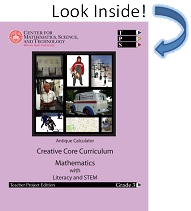Third Grade Mathematics 
Operations and Algebraic Thinking
Ski Math
Students make ski lifts in their classroom with a string between two pulleys. They put a piece of tape at given intervals on the “haul rope” to indicate where the chairs will attach. Chairs are made of pipe cleaners and construction paper. Students time the run from end to end and calculate speed. They multiply to find passenger capacities at various speeds.
Numbers of Operations in Base Ten
Antique Calculator
Students cut a piece of cardstock with 4 windows, one for ones, one for tens, one for hundreds, and one for thousands. They staple another piece of cardstock behind the windows and slide paper drywall tape in the windows. These pieces are numbered 0-9 and the ends are taped together to form a continuous loop. By sliding the paper loop, they can count and add.
Numbers of Operations, Fractions
Tetrahedron Kite
Each student uses 3 drinking straws of various colors and lightweight string to make a triangle. By adding 3 more pieces a triangular pyramid can be formed. Tissue paper is taped to two sides. By tying a string to the side, the structure can be flown as a box kite. Students determine what fraction the various colored straws make of the whole.
Four pyramids can be tied together to form a tetrahedron. This will make a more stable kite. More fractions can be determined. Fractions can be added and subtracted. Four of the larger tetrahedrons can be tied together to make a larger kite that contains 16 individual parts. More fractions can be calculated. The 16 piece kite will fly very well.
Measurement and Data
Delivery Route
Students obtain a map of their neighborhood and measure distances. They also identify geometric shapes found and determine perimeter and area. Students then identify the location of several customers on a milk delivery route from 100 years ago. They draw a route and measure distances. Students also determine total time by calculating speed and adding a set time for each delivery and graph their results. They alter their vehicles to adjust time (walking, bike, horse, car, etc).
Geometry
Geometric Design
Students use tiles, fabric, or other materials to combine geometric shapes into an artistic design. Shapes can be cut in half or quarters to form other shapes and to experience fractions.

